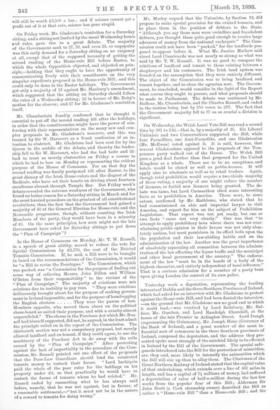On Wednesday, the Welsh Local Veto Bill was read a
second time by 281 to 246,—that is, by a majority of 35. Six Liberal Unionists and two Conservatives supported the Bill, while four Parnellites, one Anti-Parnellite, and one Gladstonian (Mr. McEwan) voted against it. It is said, however, that several Gladetonians opposed to the proposals of the Tem- perance party walked out of the House. The Welsh Bill goes a good deal further than that proposed for the United Kingdom as a whole. There are to be no exceptions, and hotels would be closed as well as public-houses. It will apply also to wholesale as well as to retail traders. Again, though total prohibition would require a two-thirds majority of those voting, a majority of one might reduce the number of licences, or forbid new licences being granted. The de- bate was tame, but Lord Carmarthen cited some interesting facts as to prohibition in America. These were, to some extent, confirmed by Mr. Rathbone, who stated that he had commissioned an able and impartial lawyer to visit America, and report for him on the subject of Prohibition Legislation. That report was not yet ready, but one or two facts " came out very clearly." One was that "to attempt to apply prohibitory laws where there was not over- whelming public opinion in their favour was not only abso- lutely useless, but most pernicious in its effect both upon the the population and their law-abiding habits and on the administration of the law. Another was the great importance of absolutely separating all connection between the adminis- tration of the law affecting the liquor traffic and the municipal and other local government of the country." The enforce- ment of the law "must be in the hands of a body of the highest character, and entirely independent of local influence." That is a curious admission for a member of a party bent upon giving London the control of its own police.


































 Previous page
Previous page